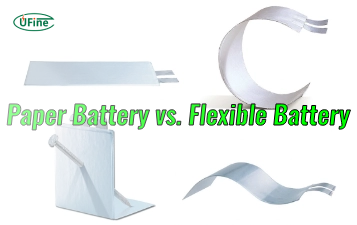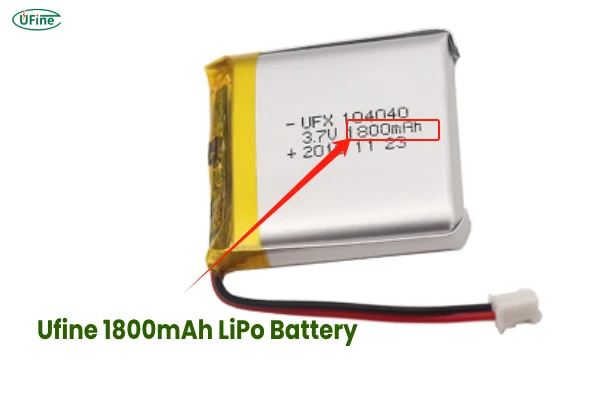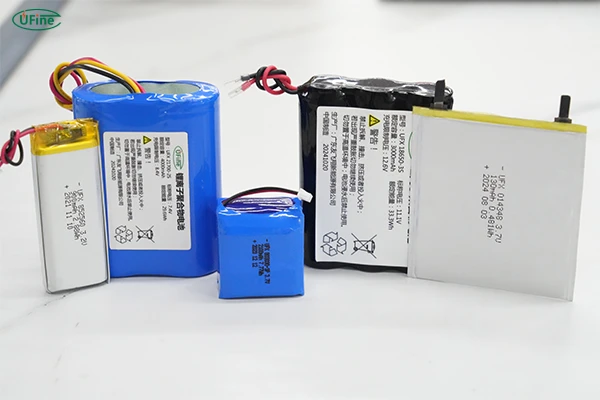Have you ever found yourself wondering, “How long will a 1800mAh battery last?” Whether it’s powering your remote control car, flashlight, drone, or another gadget, it’s essential to know exactly how much time you can expect from that small, yet powerful battery.
The 1800mAh battery is commonly used in various devices, but the truth is that its lifespan isn’t as straightforward as you might think. A lot of factors contribute to how long it will last, and in this guide, we’ll explore them all—taking you on a journey through battery chemistry, usage habits, and tips on how to make the most of your 1800mAh battery.
If you’re serious about getting the best performance from your battery, you’re in the right place. Let’s dive in!
Part 1. What Does mAh mean?
mAh stands for milliampere-hour, a unit that measures the energy capacity of a battery. Think of it like the size of a fuel tank. The larger the mAh, the more charge the battery can store, which translates to longer runtime.
In practical terms, a 1800mAh battery can supply 1800 milliamps (or 1.8 amps) of current for one hour. Alternatively, it can supply 900 milliamps for two hours, and so on. This is where the conversation starts, but there’s much more to it.
Part 2. Different types of 1800mAh batteries
Not all 1800mAh batteries are created equal. While the number of milliamps gives us a basic understanding of its capacity, the chemistry of the battery plays a huge role in determining its performance and longevity. Different battery chemistries come with varying benefits and challenges. Here are the main types you’ll encounter:
- Lithium-ion (Li-ion): These are commonly used in smartphones, laptops, and drones. Li-ion batteries are known for their high energy density, long lifespan, and relatively fast charging time. They’re perfect for devices that need a lightweight and efficient power source.
- Lithium Polymer (LiPo): Very similar to Li-ion, LiPo batteries offer greater flexibility in shape, making them ideal for devices where space is a premium—such as in remote control cars, drones, and toys. LiPo batteries have a higher discharge rate, which is excellent for high-power devices.
- Nickel Metal Hydride (NiMH): Although not as common as Li-ion or LiPo, NiMH batteries are still widely used in various devices. They are safer than LiPo, with a lower risk of leakage or fire. However, they’re bulkier and typically have a shorter lifespan when compared to lithium-based batteries.
NiMH Battery vs Li-Ion Battery vs NiCad Battery: How are they different?
At Ufine Battery, we understand that every customer has unique needs, which is why we specialize in creating custom lithium batteries—including LiPo and LiFePO4 options—to suit your specific applications. Whether you’re working with high-rate devices or need a flexible battery shape, we can tailor a solution just for you.
Part 3. Common voltages
When talking about battery lifespan, you cannot overlook voltage. The voltage of a battery affects how much power it can deliver to your device.
- 3.7V: This is the most common voltage for Li-ion and LiPo batteries. It’s the standard for many small devices like drones and mobile phones.
- 1.2V / 1.5V: These voltages are typically used in NiMH and alkaline batteries, respectively. These are often used in household devices and low-power gadgets.
- 7.4V / 11.1V: These higher voltages are found in multi-cell packs (like 2S and 3S LiPo batteries), often used in high-performance applications such as remote control cars, drones, and even electric vehicles.
Higher voltage generally means more power, but also more power consumption. A higher voltage battery will drain faster if your device is designed to pull a lot of current.
Part 4. What affects the life of 1800mah battery?
Now that we have a basic understanding of capacity and voltage, it’s time to dive into the factors that actually affect the lifespan of a 1800mAh battery. It’s not just about the numbers—other elements come into play too. Here’s what you should know:
- Device Power Consumption: The more power your device requires, the faster your 1800mAh battery will drain. For example, a high-performance drone pulling 10A will consume your 1800mAh battery much faster than a small toy car that requires just 2A.
- Battery Age: As batteries age, they lose capacity. Over time, the battery’s ability to hold a charge diminishes, and it will need to be replaced. This is an important thing to consider if you’ve had your 1800mAh battery for a while.
- Temperature: Batteries are sensitive to temperature. High temperatures can cause the battery to heat up, leading to potential damage or reduced capacity. On the other hand, cold temperatures can increase the internal resistance, making it harder for the battery to discharge. Always store and use your battery at moderate temperatures.
- Discharge Rate: Batteries that are discharged too quickly (i.e., high current draw) tend to wear out faster. This is especially important for high-drain devices like drones, where the battery is often pushed to its limits.
Part 5. Understanding battery cycle life
When we talk about how long a battery lasts, we can’t ignore the concept of cycle life. Cycle life refers to the number of complete charge and discharge cycles a battery can undergo before its capacity starts to decline.
- Li-ion / LiPo Batteries: Typically last between 300 to 500 cycles before their performance degrades.
- NiMH Batteries: They generally have a longer cycle life, with up to 500 to 1000 cycles.
So, if you’re using your 1800mAh battery every day, it could last a year or more. However, after that time, you might notice that the battery holds less charge than it did when it was new.
Part 6. How many hours can a 1800mAh battery run?
Here’s the question you’ve been waiting for: How long can a 1800mAh battery actually run?
To estimate how long your battery will last, we need to know the current draw of the device.
If your device uses 180 milliamps (mA), the battery would theoretically last:
1800mAh ÷ 180mA = 10 hours.
However, if your device draws 900mA, it will run for:
1800mAh ÷ 900mA = 2 hours.
This means the runtime depends entirely on how much power your device is using. More powerful devices draw more current, reducing the time the 1800mAh battery will last.
Part 7. How to extend the life of your 1800mAh battery?
You don’t want your 1800mAh battery to die sooner than necessary. Fortunately, there are several ways to extend its lifespan and improve its performance:
- Avoid deep discharges: Try not to let the battery drain to 0%. Ideally, charge it when it reaches around 20%-30%.
- Charge properly: Always use the right charger for your battery. Overcharging or using the wrong charger can shorten the battery’s life.
- Keep it cool: Heat is the enemy of battery health. Store your battery in a cool, dry place, and avoid using it in extremely hot conditions.
- Store partially charged: If you’re not using your battery for a while, store it at about 40%-60% charge. This prevents it from becoming too drained or overcharged.
- Use a slow charger: Fast chargers can degrade battery health over time. If possible, use a slow charger for a gentler, longer-lasting charge.
Part 8. Storage, maintenance and care
When you’re not using your 1800mAh battery, how you store it matters.
- Store in a cool, dry place
- Avoid metal objects nearby to prevent short circuits
- For long storage, discharge slightly (especially LiPo batteries)
- Use fireproof bags for LiPo battery storage
Cleaning the contacts regularly and inspecting for swelling or damage can also prolong the life of your 1800mAh battery.
Part 9. Why choosing the right battery matters: Ufine Battery
At Ufine Battery, we understand that every battery needs are unique. That’s why we offer custom lithium battery solutions tailored to your specific requirements. Whether you need a LiPo battery for your remote control car or a LiFePO4 battery for high-rate applications, we’ve got you covered.
We manufacture batteries with different sizes, voltages, capacities, and rates, so no matter what device you’re working with, we can customize a solution just for you.
If you need help selecting the right battery for your application, contact Ufine Battery today, and our team of experts will guide you through the best options available!
Part 10. FAQs
Can I use a 1800mAh battery instead of a 1500mAh battery?
Yes! It will last longer. Just make sure the voltage matches.
How long to charge a 1800mAh battery?
With a 1A charger, it takes around 1.8 to 2 hours. Always follow manufacturer instructions.
Is 1800mAh good for RC cars or drones?
Yes, it’s commonly used for lightweight drones, RC cars, and helicopters.
Can I replace a 1800mAh Li-ion with a 1800mAh NiMH?
Not usually. The voltage and performance differ. Match the chemistry type.
How do I know if my 1800mAh battery is dead?
If it doesn’t hold charge, gets hot, or looks swollen, it’s time to replace it.
Related Tags:
More Articles

Paper Battery vs. Flexible Battery: What’s the Difference and Which Is Better?
Paper vs. flexible batteries: learn the key differences, benefits, and which power source fits best for wearables, sensors, and smart tech.
What to Know Before Buying a Tiny LiPo Battery for Your Project
Tiny LiPo batteries are powerful and compact. Learn how to choose the right one for your project with specs, safety, and charging tips.
Bloated LiPo Battery: Will It Explode?
Will a bloated LiPo battery explode? Discover the causes, risks, safety steps, and expert tips to avoid disaster and protect your gear. Must-read safety guide!
12V 100Ah Lithium Ion Battery Price: Full Guide
Learn about 12V 100Ah lithium-ion battery price, from cost ranges to best brands, hidden fees, and how to get the best deal. A must-read for smart buyers!
Resistance and Conductivity: What It Means for Your Lithium Batteries
Resistance and conductivity impact lithium battery performance, lifespan, and safety—learn how they work and why they matter.





